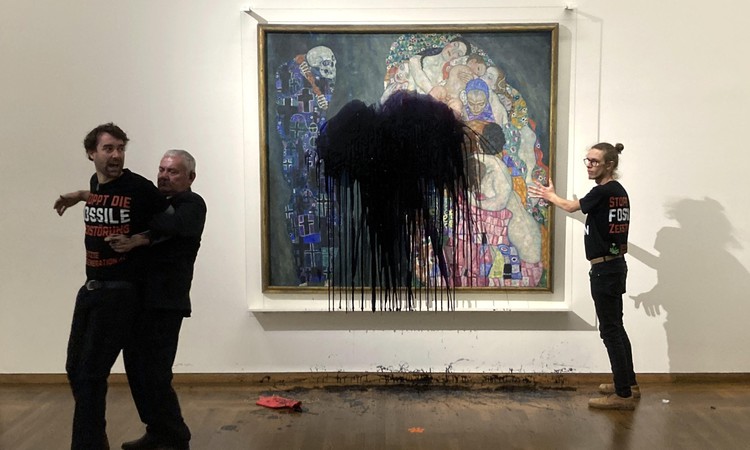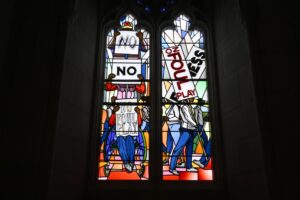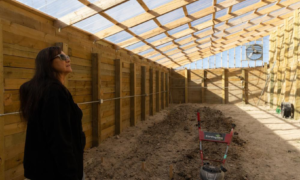Climate activists in Austria have attacked a painting by Gustav Klimt, with one throwing a black, oily liquid at it and another gluing himself to the glass covering the painting.
Members of Letzte Generation Österreich (Last Generation Austria) tweeted that they had targeted the 1915 painting Death and Life at the Leopold Museum in Vienna to protest against their government’s use of fossil fuels.
After throwing the liquid at the artwork, which was not damaged, one activist was pushed away by a museum guard while another glued his hand to the glass over the painting.
The group said they were protesting against “oil and gas drilling”, which they called “a death sentence to society”.
In a video of the incident, which the group posted online, one of the activists can be heard shouting: “We have known about the problem for 50 years – we must finally act, otherwise the planet will be broken.”
After the attack, police arrived at the museum and the black liquid, which the activists had brought in in a hot water bottle under their clothes, was cleaned off the protective glass, the Austria Press Agency reported.
The museum’s restoration team said later that while the painting itself had not been harmed, the damage to the glass and security framing, as well as to the wall and floor, was “evident and significant”.
Hans-Peter Wipplinger, the director of the museum, told the news agency that the concerns of the climate activists were justified, “but attacking works of art is definitely the wrong way to implement the targeted goal of preventing the predicted climate collapse”. He appealed to the group to find other ways to make their concerns known.
Austria’s culture minister also expressed understanding for “the concerns and also the desperation” of the activists, but criticised their form of protest.
“I do not believe that actions like these are purposeful, because the question arises whether they do not rather lead to more lack of understanding than to more awareness of the climate catastrophe,” Andrea Mayer said. “From my point of view, accepting the risk of irrevocable damage to works of art is the wrong way to go. Art and culture are allies in the fight against climate catastrophe, not adversaries.”
The Klimt work is an oil on canvas painting in the Art Nouveau style depicting death on the left side and a group of partially naked, hugging people on the right. It’s one of the latest pieces of art to be targeted by climate activists in recent months.
In Germany, mashed potatoes were thrown at a Claude Monet painting, while the British group Just Stop Oil threw tomato soup at Vincent van Gogh’s Sunflowers in London’s National Gallery last month.
Activists also glued themselves to John Constable’s The Hay Wain in the National Gallery, and to the frame of an early copy of Leonardo da Vinci’s The Last Supper at London’s Royal Academy of Arts.
There can be no more hiding, and no more denying. Global heating is supercharging extreme weather at an astonishing speed. Guardian analysis recently revealed how human-caused climate breakdown is accelerating the toll of extreme weather across the planet. People across the world are losing their lives and livelihoods due to more deadly and more frequent heatwaves, floods, wildfires and droughts triggered by the climate crisis. At the Guardian, we will not stop giving this life-altering issue the urgency and attention it demands. We have a huge global team of climate writers around the world and have recently appointed an extreme weather correspondent.
Our editorial independence means we are free to write and publish journalism which prioritises the crisis. We can highlight the climate policy successes and failings of those who lead us in these challenging times. We have no shareholders and no billionaire owner, just the determination and passion to deliver high-impact global reporting, free from commercial or political influence.
And we provide all this for free, for everyone to read. We do this because we believe in information equality. Greater numbers of people can keep track of the global events shaping our world, understand their impact on people and communities, and become inspired to take meaningful action. Millions can benefit from open access to quality, truthful news, regardless of their ability to pay for it.
Every contribution, however big or small, powers our journalism and sustains our future. Support the Guardian from as little as $1 – it only takes a minute. If you can, please consider supporting us with a regular amount each month. Thank you.




